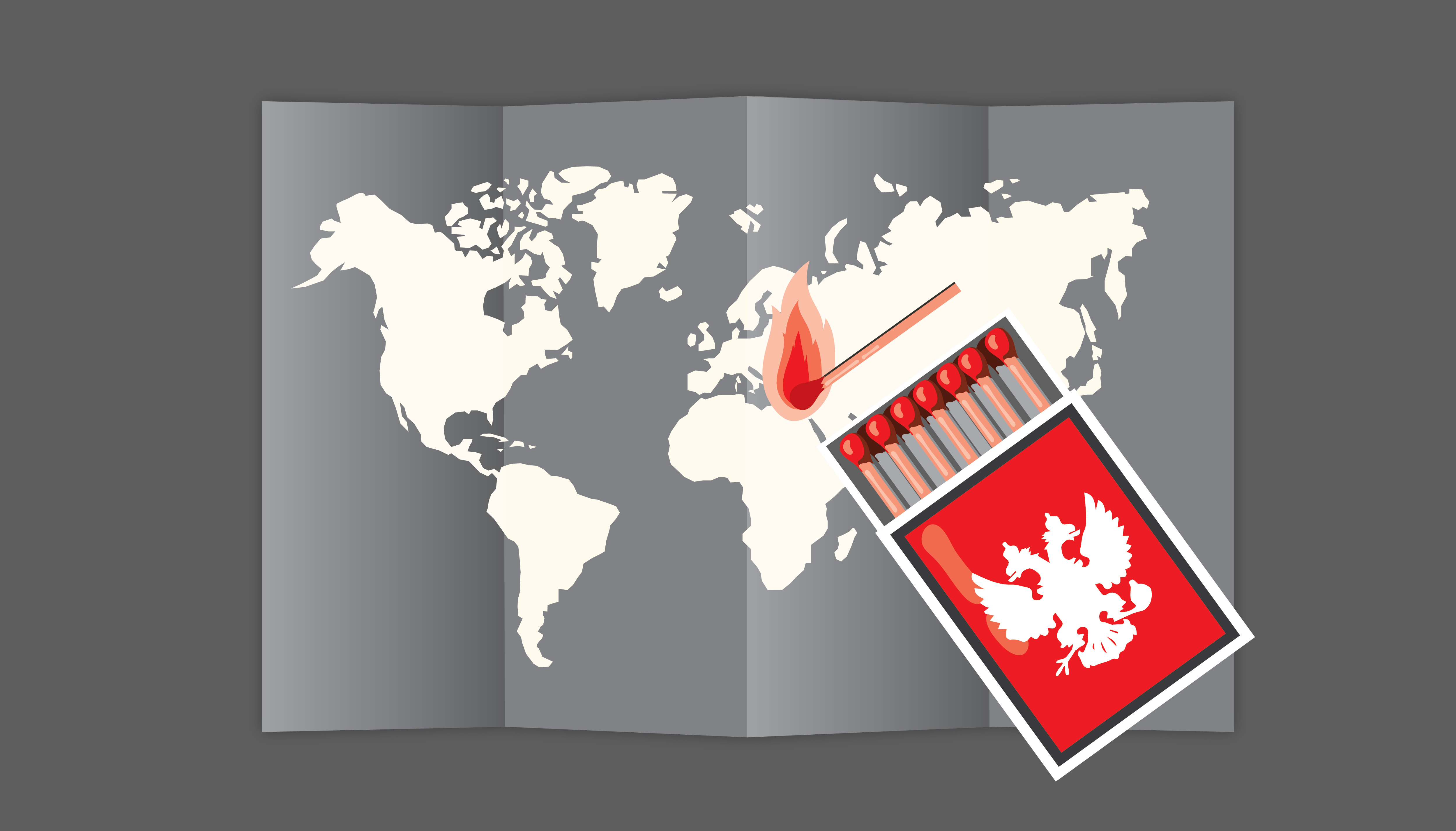

Українською читайте тут.
The Kremlin benefits from the escalation of the conflict in the Middle East, as it draws attention away from the Russian military’s actions in Ukraine. Additionally, the propaganda portrays the escalation in a light that favors Moscow at a time when most Russians are probably uninterested in understanding the complexity of the situation. For instance, on October 7, 2023, Russian propagandist Vladimir Solovyov labeled Hamas’s attack a “hard slap” to Israel and its intelligence services, attributing all blame for the situation to the US as the “keeper of peace in the region.” He also baselessly accused Ukraine of supplying weapons to the Palestinian terrorist organization. In this article, we analyze Moscow’s key propaganda messages in response to Hamas’s terrorist attack on Israel.
On the morning of October 7, southern regions of Israel were attacked by Hamas from the Gaza Strip (an area of the partially recognized State of Palestine), which effectively controls the territory and is recognized as a terrorist organization in Western countries. This ground attack was preceded by a massive rocket assault on the country’s cities, catching Israel’s security forces off guard. The attack, as of the morning of October 11, has claimed the lives of approximately 1,200 Israelis, primarily civilians. About 150 people have been taken hostage and transported to Gaza. The attack was psychologically amplified by its media component. Social media users all over the world were stunned by images of dead Israelis, video testimonies of frightened witnesses of the attack, and the brutal transportation of captives to Gaza by Hamas militants. The assault occurred during significant Jewish holidays. This year, on October 7, the Jewish holiday of Simchat Torah coincided with Shabbat, amplifying the impact. These events represent the most significant security challenge for the country in the last 50 years. Exactly 50 years ago, on the Jewish Day of Atonement, the Yom Kippur War started when Egypt and Syria unexpectedly attacked Israel in October 1973. Israel emerged victorious from that existential war against a coalition of Arab countries. Clearly, Hamas dedicated its current attack to those events. For the first time since then, Israel has formally declared war, already mobilizing over 300,000 reservists. Israeli Prime Minister Benjamin Netanyahu announced a war that would crush Hamas and fundamentally change the Middle East landscape.
Immediately after the attack, IDF (Israel Defense Forces) commenced intensive bombardment of suspected militant locations in the Gaza Strip. This area is one of the most densely populated in the world, so the strikes resulted in civilian casualties. Palestinian officials report about 950 deaths from these strikes as of the morning of October 11. Israel insists that hundreds of them were Hamas fighters. Over 2 million people live in the Hamas-controlled territory. On October 9, the Israeli military also ordered a complete siege of the Gaza Strip, cutting off the supply of food, water, fuel, and other goods. Human Rights Watch labeled this a war crime. As of October 11, there is a possibility of the Iran and Syria-supported Lebanese militant group Hezbollah joining the war against Israel from the north. Some observers even fear the involvement of Iran and the US in the conflict, indicating the situation’s potential to escalate significantly.
Experts from the Institute for the Study of War (ISW) warn that the Kremlin is exploiting Hamas’s attack on Israel to advance narratives about diminishing US and Western support and attention to Ukraine. The Kremlin has initiated several information operations following Hamas’ attacks, accusing the West of neglecting Middle East conflicts to favor supporting Ukraine. The propagandists are trying to:
a) demoralize Ukrainian society by claiming that Ukraine will lose international support;
b) influence the domestic audience by suggesting that Russia will soon triumph as international attention and military aid are focused on the Middle East, and Ukraine will be forgotten;
c) convince the average European or American to reduce or halt military support to Ukraine significantly.
We have compiled a series of key messages disseminated by Russian propaganda to achieve its objectives.
“The US is to Blame for the War”
Putin referred to the war in Israel as a “clear example of the failure of US policy in the Middle East” and called for the establishment of an independent Palestinian state. “The US has pressured both sides, back and forth, but always without considering the core interests of the Palestinian people, particularly the implementation of UN Security Council resolutions on the creation of an independent sovereign Palestinian state,” Putin stated. Hence, Putin describes the current terrorist attack on civilians as a result of the US’s insufficient consideration of the interests of the Palestinians. Trump echoed the sentiment of US culpability but with a different focus, saying, “The Israeli attack was made because we are perceived as being weak and ineffective and with a really weak leader.”
The US has spent decades seeking solutions to the Israeli-Palestinian conflict, a primary driver of regional geopolitical dynamics. To enhance the effectiveness of its international policy, it’s crucial for the US to reconcile its key ally, Israel, with other regional partners like Turkey, Saudi Arabia, and Egypt. However, the Israeli-Palestinian conflict remains a complex obstacle without a straightforward solution owing to a combination of historical and political factors. The Trump administration adopted a pro-Israel policy, for instance, opening a US embassy in the contested city of Jerusalem, inciting additional outrage in the Arab world. In contrast, the Biden administration has tried to restore balance to its Middle East policy in recent years, reinstating aid programs for Palestinians.
“Ukraine Sold Western Weapons to Hamas Terrorists”
“I am waiting for photos of the weapons Palestine is using to attack Israel. I have a feeling that it might include those supplied by the West to Ukraine. This is even more powerful than the PR stunt with Bucha,” a propagandist wrote on his Telegram channel in the initial hours of the attack. A swift response followed: “The weapons the West supplied to Ukraine are now being used by Hamas,” a false claim that spread rapidly through propaganda channels. Propagandists circulated videos alleging that the Middle Eastern social media groups report the majority of rocket-propelled grenades used by Hamas in Operation “Al-Aqsa Flood” originated from Ukraine. Furthermore, Palestinian militants supposedly thanked Ukraine for the weapons sale. Another disinformation initiation point was Israeli Prime Minister Netanyahu’s June statement about weapons supplied to Ukraine. His words were taken out of context, suggesting he was concerned that weapons the West provided to Ukraine would be used against Israel.
In reality, the primary supplier of weapons to Hamas is Iran. This attack reflects Tehran’s long-term ambitions to surround Israel with legions of militants armed with increasingly sophisticated weapons. Hamas has historically maintained some independence from Tehran and is not a full-fledged Iranian proxy group like the Lebanese “Hezbollah.” However, in recent years, Hamas has received technical support from Iran in producing rockets and drones, and official figures in Tehran have publicly boasted about the significant military aid given to Hamas over the past years. Thus, baseless accusations against Kyiv supporting militants represent another attempt to undermine Ukraine’s international image.
“The West is Fully Focused on Israel, Leaving Ukraine Conserving Ammunition”
Propagandists are attempting to undermine Ukrainians’ confidence in allied support, utilizing the Middle East crisis to spawn such narratives. “From the looks of it, Ukraine has begun rationing its ammunition, especially around Crimea. Because soon there will be nothing left [to fire with], as Israel takes precedence,” states a post from an anonymous Telegram channel. The propaganda insists that for the US and Europe, Ukraine is a secondary issue compared to Israel, indicating resources will be directed there instead. These messages fit into the broader narrative of Russian agitprop, claiming that due to the Republicans’ stance, there has been a “transition of Ukraine to a starvation financial ration from the US.” Consequently, propagandists assert, the West will undoubtedly need to freeze the war in Ukraine, even if it means meeting some of Moscow’s demands, to focus its attention and resources on the volatile Middle East.
Nevertheless, the US Army is striving to supply its Ukrainian and Israeli allies with the necessary amount of ammunition and other equipment. US Secretary of the Army Christine Wormuth reported that her department is working on approving additional funding to ensure the Pentagon’s plans for production and acquisition of ammunition can simultaneously meet the needs of both Israel and Ukraine.
“Israel Initiated This War to Resolve an Internal Political Crisis”
“Someone deliberately let the Palestinians take this ‘bait,’ so that the lives of hundreds of Israelis could justify the subsequent bloody events. Perhaps, Israel knew and gave them the opportunity to ‘cut’ and capture, to dismantle the whole of Palestine then, taking all their lands for themselves. Also, there has been a prolonged political crisis in Israel, and someone needed this war. Both sides of Israeli politics, as we see it,” Russian propagandists suggested on another anonymous Telegram channel.
Israel’s military doctrine places the highest value on a soldier’s life. One only needs to recall instances after the Six-Day War when 11 Israeli military personnel, 3 bodies of soldiers, and 1 body of a civilian were exchanged for 6,000 Syrian and Egyptian soldiers; or in 2011, when one Israeli soldier was returned in exchange for a thousand imprisoned Palestinian militants.
With such statements, propagandists only exhibit disdain for the lives of their own soldiers and civilians. Israel’s response to the militant attack may indeed be influenced by domestic political sentiments, but it seems absurd to place the blame on the Israeli government for an attack that caught the country by surprise and for which the government is being criticized.
“Israel — A Terrorist State and a Mistake of a State”
“Although Palestine has not declared war on Israel (de jure), Hamas’s actions on Israeli soil are terrorism. Likewise, Israel has not declared war on Palestine, and its actions, including demolishing buildings in the Gaza Strip, are also acts of terrorism. It seems we are witnessing a battle between terrorists,” propagandists conjectured cynically in the initial days of the escalation before Israel officially declared martial law. They attempted to equate defensive actions with acts of terrorism, a typical tactic of shifting blame and negatively portraying the victim (Israel) as a terrorist state. “If it’s a Russian bomb, it’s obviously a war crime and an act of state terrorism, regardless of whose house it is. But if it’s an Israeli bomb and the building is Palestinian, that’s acceptable; it’s a preemptive strike against a terrorist lair. If the bomb is American and the building Iraqi, Afghan, Libyan, or Serbian, that’s also fine; it’s a fight for democracy for their own good,” the propagandists sarcastically remarked, in another display of whataboutism.
Several messages were focused on Israel’s future security vulnerability, predicting the country’s fatal destiny: “About Israel: it is a mistake of a state. The existence of Israel as a mono-national state, where the life of the main nation-forming entity is maintained through oppression and terror against other nations, and the regime is supported by the bayonets of the Israel Defense Forces, the saboteurs of Mossad, American money, and the world’s guilt for the Holocaust during World War II, is questionable,” read a post on an anonymous Telegram channel disseminating Russian propaganda. “Israel has no prospects in the new multipolar world, where military power determines everything,” another chimed in. Yet currently, Israel boasts one of the world’s most combat-ready armies, having waged and won several existential wars against numerically superior opponents since its establishment. Israel is among the nine countries possessing nuclear weapons and ranks in the top ten arms exporters worldwide, despite its small size. The country’s security situation has been improving in recent years due to the normalization of relations with previously hostile Arab nations like Egypt, Jordan, the UAE, and Bahrain. Additionally, negotiations have begun for normalizing relations with the regional powerhouse, Saudi Arabia. Israel’s security rests on one of the world’s most innovative economies, with a GDP per capita approximately four times that of Russia. Moreover, Israel has earned the reputation of a “startup nation” and a technological superpower. It has the highest percentage of the population working in high-tech (10% of all Israelis work in high-tech, according to an Israel Innovation Authority report). Israel is a global leader in agricultural technology, especially in arid conditions farming. Given such potential, dubbing Israel a failed state is, at the very least, misguided.
Intensification of Anti-Semitic Rhetoric in Russian Politics
The Kremlin is intimidating those Russians who have moved to Israel and supported Ukraine; they are threatened with dire consequences, referred to as “Magadan,” [major transit center for political prisoners during the Stalin era] should they decide to return to Russia. Vyacheslav Volodin, the Chairman of the State Duma, stated, “Those relocatees who left Russia and acted despicably, cheering at the shots fired at Russian territory and wishing victory to the bloody Nazi regime in Kyiv, are not only unwelcome in Russia but, if they return, ‘Magadan’ is guaranteed for them.”
Sergey Markov, a former advisor to Putin, blamed Russian emigrants for instigating the war in Israel, claiming that they “terrify” every country they flee to. Propagandists rejoiced at the fear of Russian Jews who emigrated to Israel. They stated, “The likes of Chubais and other Moishes should be under tremendous stress now. They fled from war but ended up at the epicenter of a hot spot. I wonder where Alla Borisovna [Pugacheva] will head next. Is it interesting if Sobchak, with an Israeli passport, will go fight against Hamas, being mobilized according to local laws?” Anti-Semitism is on the rise among ordinary Russians and high-ranking officials alike. On the eve of the escalation in Israel, military correspondent Dmitry Steshin, known for his openly genocidal statements about Ukrainians, said that there should be “not a drop of pity or compassion” towards Israelis, including former Russians. He referred to those who moved from Russia to Israel as “relocatees” and wrote, “We stayed here and still stand knee-deep in blood. Let those responsible for our tears do the same! Or let them run to refresh historical memory. Greetings to the relocatees!”
Supporters of Putin’s regime, and Putin himself, are increasingly indulging in anti-Semitic remarks. This late Putinist trend is reminiscent of late Stalinism. Joseph Stalin, who did not exhibit anti-Semitism early in his rule, began fighting “Zionists” and “rootless cosmopolitans” — essentially the Jewish minority — after World War II. We have explored this topic in more detail here.
Predicting the impact of the dramatic military escalation in the Middle East on the war in Ukraine is rather challenging. One of the objectives of the well-prepared attack on Israel could have been an attempt to disrupt Israel’s normalization of relations with neighboring Arab countries, especially Saudi Arabia, as suggested by US Secretary of State Antony Blinken. This normalization directly affects the nature of US relations with the Saudis, which have recently cooled due to the Arabian Peninsula leader’s reluctance to increase oil production amid energy sanctions against Russia. The Yom Kippur War half a century ago ultimately led to the world’s most significant energy crisis when Arab countries, led by the Saudis, refused to supply oil to Israel’s Western allies. Meanwhile, the Hamas attack, endorsed by Iran — a country supporting Russia’s aggression against Ukraine — underscores the growing global threats to Western democracies. A coalition of undemocratic, anti-Western countries ready for escalation is emerging. Iran, Russia, and North Korea have begun to strengthen each other militarily. At the right time, the world’s second-largest economy, China, might also play a more active role in exerting pressure on the West. This is probably the worst time to show weakness in supporting Ukraine, something US congressmen are likely to consider during discussions on multi-billion dollar aid packages for our country.
Moscow, in any case, will try to exploit the escalation in Israel to its advantage, especially in the realm of information. Pro-Kremlin mouthpieces are trying to push a series of messages: firstly, that the escalation was caused by the West’s flawed and unbalanced policy, which due to “excessive attention” to Ukraine, overlooked the volatility of the situation in the Middle East; secondly, they are “normalizing” violent and aggressive methods in geopolitical relations, thereby broadening the acceptable spectrum. Allegedly, it’s not only the “Russian world” that is defending its interests violently, but the Arab world is also fighting manifestations of “American neo-imperialism.”


